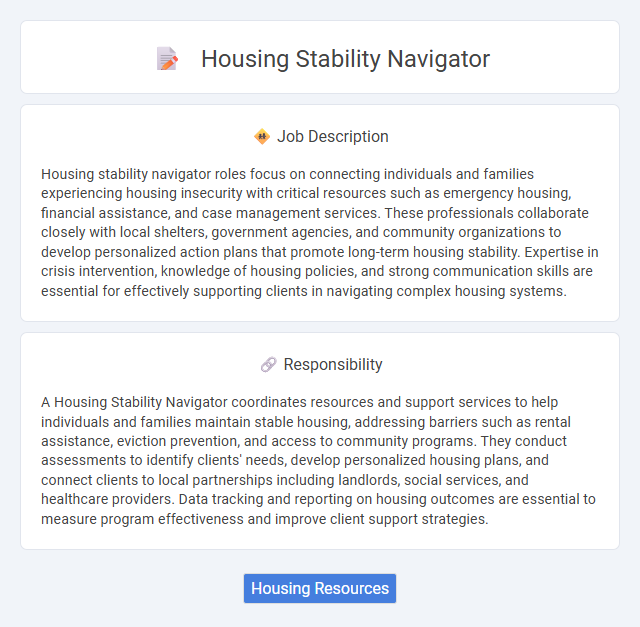
Housing stability navigator roles focus on connecting individuals and families experiencing housing insecurity with critical resources such as emergency housing, financial assistance, and case management services. These professionals collaborate closely with local shelters, government agencies, and community organizations to develop personalized action plans that promote long-term housing stability. Expertise in crisis intervention, knowledge of housing policies, and strong communication skills are essential for effectively supporting clients in navigating complex housing systems.
Individuals with strong empathy, excellent communication skills, and resilience are likely well-suited for a Housing Stability Navigator role, as the job often involves supporting people experiencing housing insecurity. Those who can manage stress effectively and demonstrate patience may find it easier to connect with clients facing complex, urgent challenges. Conversely, candidates lacking emotional resilience or interpersonal skills might struggle with the demands of this position.
Qualification
Housing Stability Navigator roles require strong knowledge of social services, housing policies, and community resources to support clients in securing stable living environments. Candidates typically need a background in social work, psychology, or a related human services field, along with experience in case management and crisis intervention. Excellent communication, problem-solving skills, and the ability to collaborate with landlords, agencies, and clients are essential qualifications for effective service delivery.
Responsibility
A Housing Stability Navigator coordinates resources and support services to help individuals and families maintain stable housing, addressing barriers such as rental assistance, eviction prevention, and access to community programs. They conduct assessments to identify clients' needs, develop personalized housing plans, and connect clients to local partnerships including landlords, social services, and healthcare providers. Data tracking and reporting on housing outcomes are essential to measure program effectiveness and improve client support strategies.
Benefit
Housing stability navigators likely improve access to crucial resources and services, reducing the risk of homelessness for vulnerable populations. Their support may enhance long-term housing security by coordinating personalized plans and connecting clients to housing options and financial assistance. By addressing barriers to stable housing, they probably contribute to better overall community health and economic outcomes.
Challenge
Housing Stability Navigators likely face challenges in addressing the complex needs of individuals experiencing housing insecurity, often navigating limited resources and systemic barriers. They probably encounter difficulties coordinating with multiple agencies to provide comprehensive support and securing sustainable housing solutions. The role may also involve managing high caseloads, which can impact the ability to offer personalized assistance consistently.
Career Advancement
A Housing Stability Navigator role offers critical experience in social services, case management, and client advocacy, which are highly valued in nonprofit and government sectors. Developing expertise in housing policies, crisis intervention, and resource coordination positions professionals for advancement to supervisory or program management roles. Mastery of community engagement and data tracking tools enhances opportunities for career growth in housing stability and related social work fields.
Key Terms
Housing Resources
Housing stability navigators connect individuals to critical housing resources such as rental assistance programs, emergency shelters, and affordable housing options to prevent homelessness. They maintain up-to-date knowledge of local housing policies, subsidies, and community support services to facilitate long-term stability. Expertise in navigating bureaucratic processes enables effective advocacy for clients facing housing insecurity.
 kuljobs.com
kuljobs.com